2019年成考专升本英语动词不定式归纳(10)
动词不定式(专升本)

四 不定式结构作宾语补足语 1、只能用不定式结构作宾语补足语的动词
① 表示“希望”“愿望”等心理状态的动词,如:wish, desire, expect, love, prefer, encourage, trust 等。 Eg : What do you desire me to do? The director preferred her to act the old lady. ②含有“让”“允许”“促使”“致使”等祈使意义 的动词,如:let, allow, permit, decide, mean, lead, bring, put, hurry, cause, 等。 Eg : We mustn’t let this (to) happen again. His father put him to mind the sheep.
⑥ 其他还有:help, teach, show, assist, report, bear, wait for, train, depend on 等。 Eg : He promised to teach me to swim. We should train them to make use of reference books. We are waiting for the train to stop.
Eg: It is not difficult for us to learn English well.
It is right for him to work here.
(3) it is +a +名词+ to do
例如: pleasure shame pity crime 等 duty
Eg : It is a duty to plant trees every day . 注: 在感叹句和疑问句中只能用it作形式主语 Eg : What fun it is to jump into a lake in summer! How long did it take you to finish the work?
专升本英语非谓语

不定式(to do)
非
过去分词(-ed) -ed分词
谓 分词
语
现在分词(-ing)
动Байду номын сангаас
词
动名词(-ing)
不定式的时态和语态
时态、语态 一般式 进行式 完成式 完成进行式
主动 to do to be doing to have done to have been doing
被动 to be done / to have been done /
1.Could you tell me whether to go for a
picnic?
2.My mother showed me how to prepare mea ls.
3)“动词+宾语+不定式” 不定式可以做宾语补足语,常见的动词有:
advise , allow , appoint , arrange for , ask , consider , expect , forbid, force , invite , j udge , like ,… 1.The officer ordered his men to fire.
(补语)
after the operation.
1.不定式做主语 一般用it当形式主语,把真正的主语不定式后置。
It took me only five minutes to finish the job. 完成那个任务花去了我五分钟。 It is very difficult for him to finish the paper in su ch a short time. 在如此短的时间内完成试卷对他来说很难。
afford(负担得起), agree(同意), dare(敢于) decide(决定), happen(碰巧),hesitate(犹豫), f ail(不能),guarantee(保证), tend(倾向), mana ge(设法), pretend(假装) ,offer(提供),plan (计划)(看书上126页)…
动词不定式归纳笔记

动词不定式归纳笔记动词不定式是动词的一种形式,通常由"to" + 动词的原形构成,例如"to eat"、"to study"、"to write"。
以下是一些关于动词不定式的归纳笔记:结构:动词不定式的一般结构为"to + 动词原形",例如"to go"。
在某些情况下,动词不定式也可以省略"to",例如在情态动词(can、should、will 等)后面,或者在使役动词(make、let、help 等)后面,例如"I can swim." 或"He made me laugh."用途:用于表达目的或原因,例如"I study hard to pass the exam."(我努力学习是为了通过考试。
)用于作为动词的宾语,例如"She likes to dance."(她喜欢跳舞。
)在被动语态中,不定式常用于表示被动的动作,例如"The book is to be read."(这本书应该被阅读。
)情态动词与动词不定式:情态动词(can、should、will 等)常常与动词不定式一起使用,构成复合谓语,例如"I can swim." 或"She should study more."(我会游泳。
她应该更多地学习。
)使役动词与动词不定式:使役动词(make、let、help 等)后面通常跟动词不定式,例如"Shemakes him laugh."(她让他笑。
)不定式短语:不定式也可以形成短语,例如"to go shopping"、"to play the piano",在这些短语中,不定式的功能更像是一个名词。
不定式知识点归纳总结
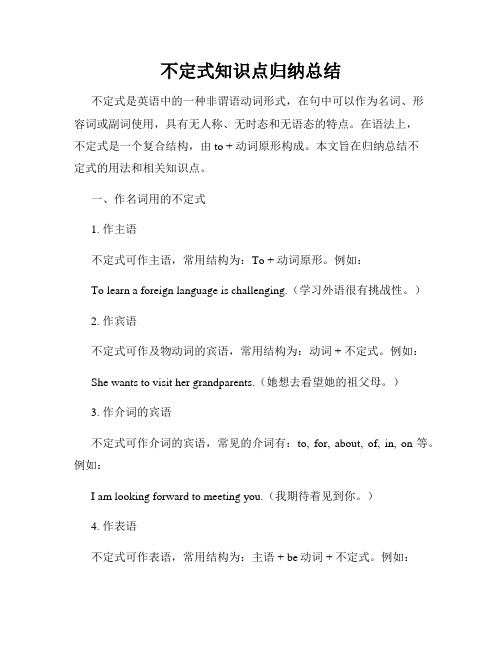
不定式知识点归纳总结不定式是英语中的一种非谓语动词形式,在句中可以作为名词、形容词或副词使用,具有无人称、无时态和无语态的特点。
在语法上,不定式是一个复合结构,由to + 动词原形构成。
本文旨在归纳总结不定式的用法和相关知识点。
一、作名词用的不定式1. 作主语不定式可作主语,常用结构为:To + 动词原形。
例如:To learn a foreign language is challenging.(学习外语很有挑战性。
)2. 作宾语不定式可作及物动词的宾语,常用结构为:动词 + 不定式。
例如:She wants to visit her grandparents.(她想去看望她的祖父母。
)3. 作介词的宾语不定式可作介词的宾语,常见的介词有:to, for, about, of, in, on等。
例如:I am looking forward to meeting you.(我期待着见到你。
)4. 作表语不定式可作表语,常用结构为:主语 + be动词 + 不定式。
例如:Her dream is to become a doctor.(她的梦想是成为一名医生。
)二、作形容词用的不定式1. 修饰名词不定式可用来修饰名词,常见结构为:a(n) + 形容词 + 不定式。
例如:He has a lot of work to do.(他有很多工作要做。
)2. 修饰不定代词不定式可用来修饰不定代词,常见的不定代词有:something, nothing, everything, someone, anyone, no one等。
例如:There is nothing to worry about.(没有什么可担心的。
)三、作副词用的不定式1. 修饰动词不定式可以修饰动词,表示动作发生的目的、结果等。
常见结构为:动词 + 不定式。
例如:He went to the store to buy some groceries.(他去商店买了些食品杂货。
成考专升本英语历年真题归类汇总—动词

Ⅷ.动词重点:动词的主要时态;被动语态的构成及其基本⽤法; 情态动词的基本⽤法(尤其是后接现在完成式);used to与be/get used to 时态 1.The teacher said that the earth ?______ around the sun.A. runB. ranC. runsD. was running 2.Tom laid on the floor, reading a book. 3.If you bring your shirt to me, I ______ it for you.A. will mendB. am mendingC. have mendedD. will have mended 4. -Did you go to Beijing last year? -No, ______.A. I have never goneB. I haven’t gone to BeijingC. I did never go thereD. I’ve never been to Beijing 5. Mr. Smith ______ here for two weeks.A. has already comeB. is already beingC. has already beenD. has already being 6. We used to go skating in Michigan every winter, but ______ for the past five seasons.A. I don’t goB. I haven’tC. I’m not goingD. I didn’t go 7. ______ lately? I have not seen you for quite some time.A. Where were you goneB. Where did you goC. Where were you goingD. Where have you been 8. We ______ a walk when it started to rain.A. takeB. tookC. are takingD. were taking 9. Although he promised to change. I’m still wondering when he ______ able to put his heart into his studies.A. wasB. will beC. beD. were 10. The lady said that she’s been living in that city for years. 11. By the time we got to the cinema the film ______for half an hour.A. has begunB. had begunC. has been onD. had been on 12. He has already gone home. But before he left, he ______ all the mistakes in his translation.A. had correctedB. has correctedC. correctedD. would correct 13. By the end of last year we ______ more than 2000 teachers of English all over the province.A. trainedB. would have trainedC. had trainedD. have trained 14. 昨天下午三班赢了那场⾜球赛。
专升本英语-非谓语动词

二、动名词作宾语
② 有些动词既能以不定式作宾语,又能以动名词作宾语,但意
思不同。
If I had remembered to close the window, the thief would
not have got in. (记得要去做某事)
I remembered seeing her once somewhere.
二、不定式的进行式
to be+动词-ing,所表示的动作与谓语动词的动作是同时发生
的,而且正在进行着
• They seem to be getting along quite well.
• He is said to be studying in New York.
三、不定式的过去式
to have+过去分词,表示动作发生在谓语动词所表示的动作之前
• He is said to have left Shanghai.
• She seems to have read the book before.
D 1. Helen had to shout ______above the sound of the music.
A. making herself hear B. to make herself hear C. making herself heard D. to make herself heard B 2.The news reporters hurried to the airport, only ______the
I want to know this matter. I don’t expect to meet you here.
1. They wanted 3. I agreed twenties.
(完整版)动词不定式用法归纳
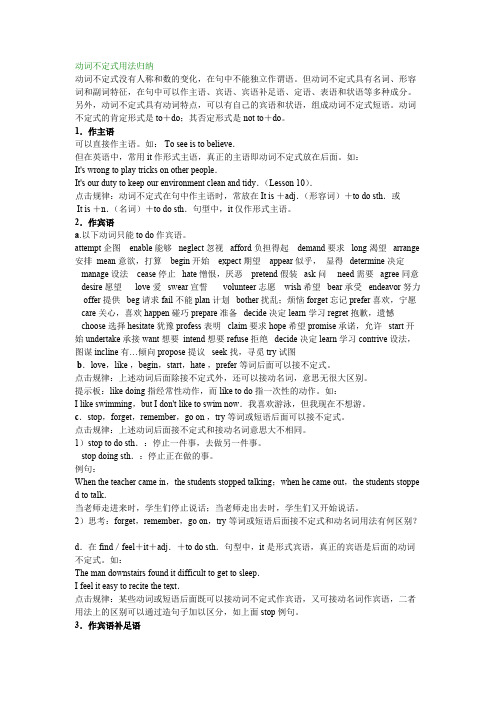
动词不定式用法归纳动词不定式没有人称和数的变化,在句中不能独立作谓语。
但动词不定式具有名词、形容词和副词特征,在句中可以作主语、宾语、宾语补足语、定语、表语和状语等多种成分。
另外,动词不定式具有动词特点,可以有自己的宾语和状语,组成动词不定式短语。
动词不定式的肯定形式是to+do;其否定形式是not to+do。
1.作主语可以直接作主语。
如: To see is to believe.但在英语中,常用it作形式主语,真正的主语即动词不定式放在后面。
如:It's wrong to play tricks on other people.It's our duty to keep our environment clean and tidy.(Lesson 10).点击规律:动词不定式在句中作主语时,常放在It is +adj.(形容词)+to do sth.或It is +n.(名词)+to do sth.句型中,it仅作形式主语。
2.作宾语a.以下动词只能to do 作宾语。
attempt企图 enable能够 neglect忽视 afford负担得起 demand要求 long渴望 arrange 安排 mean意欲,打算 begin开始 expect期望 appear似乎,显得 determine决定manage设法 cease停止 hate憎恨,厌恶 pretend假装 ask问 need需要 agree同意 desire愿望 love爱 swear宣誓 volunteer志愿 wish希望 bear承受 endeavor努力 offer提供 beg请求 fail不能 plan计划 bother扰乱;烦恼 forget忘记 prefer喜欢,宁愿 care关心,喜欢 happen碰巧 prepare准备 decide决定 learn学习 regret抱歉,遗憾choose选择 hesitate犹豫 profess表明 claim要求 hope希望 promise承诺,允许 start开始 undertake承接 want想要 intend想要 refuse拒绝 decide决定 learn学习 contrive设法,图谋 incline有…倾向 propose提议 seek找,寻觅 try试图b.love,like ,begin,start,hate ,prefer等词后面可以接不定式。
2019成考专升本《英语》词汇与语法练习及答案【10-12】
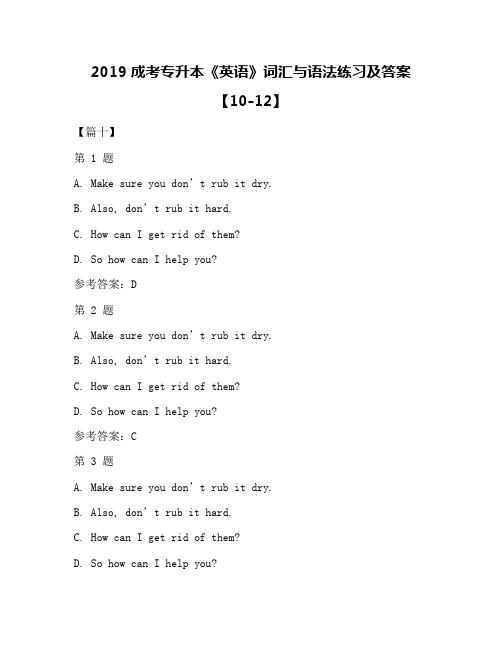
2019成考专升本《英语》词汇与语法练习及答案【10-12】【篇十】第 1 题A. Make sure you don’t rub it dry.B. Also, don’t rub it hard.C. How can I get rid of them?D. So how can I help you?参考答案:D第 2 题A. Make sure you don’t rub it dry.B. Also, don’t rub it hard.C. How can I get rid of them?D. So how can I help you?参考答案:C第 3 题A. Make sure you don’t rub it dry.B. Also, don’t rub it hard.C. How can I get rid of them?D. So how can I help you?参考答案:A第 4 题A. Make sure you don’t rub it dry.B. Also, don’t rub it hard.C. How can I get rid of them?D. So how can I help you?参考答案:BDialogue TwoBurney: There were two men, I think. No, three. They raninto the bank and the one with the gun, the tall one, he runs up to the window, and starts shouting something, I don’t know, "Give me all your money" and the other one.Police officer: 5Burney: No, there were two men and a girl. 6 the onecarrying the suitcase, well, he goes up to the other guy.Police officer: The one with the gun?Burney: Yes, and he opens the suitcase and the cashier, well, she well, all the other people behind the window they handover piles of money and two men put it into the suitcase and they run out. It was 1: 35. 7第 5 题A. They had been in there for about 5 minutes.B. It’s the other man I’m talking abou t,C. I thought you said there were three men?D. Are there any witnesses on the spot?参考答案:C第 6 题A. They had been in there for about 5 minutes.B. It’s the other man I’m talking about,C. I thought you said there were three men?D. Are there any witnesses on the spot?参考答案:B第 7 题A. They had been in there for about 5 minutes.B. It’s the other man I’m talking about,C. I thought you said there were three men?D. Are there any witnesses on the spot?参考答案:ADialogue ThreeSpeaker A:What’s your plan for the summer holiday? Speaker B: I'll visit my cousin. 8Speaker A: Is the farm big or small?Speaker B:It’s not very big, but it’s really a nice one. I’d like to go there on summer holidays.SpeakerA:I’m sure you will enjoy staying there. What does he grow on the farm?Speaker B: 9Speaker A: What are you going to do there?Speaker B: I'll go there and help him pick fruit.Speaker A:You’11 pick fruit ! It sounds fun.Speaker B: It really does. And the fruits are very delicious.I enjoy them very much.Speaker A: Are they sold here?Speaker B: Of course.10 My cousin will send them to other countries some day, too.第 8 题A. He grows oranges, peaches and grapes.B. Can you pick fruit?C. He has a farm in the countryside.D. And they are also sold in many cities in China.参考答案:C第 9 题A. He grows oranges, peaches and grapes.B. Can you pick fruit?C. He has a farm in the countryside.D. And they are also sold in many cities in China.参考答案:A第 10 题A. He grows oranges, peaches and grapes.B. Can you pick fruit?C. He has a farm in the countryside.D. And they are also sold in many cities in China.参考答案:D第 11 题A. It must be very expensive to get such a nice houseB. the guy who's selling the house has lost his jobC. It's everything we have been looking forD. Our house is outside of the city 参考答案:C第 12 题A. It must be very expensive to get such a nice houseB. the guy who's selling the house has lost his jobC. It's everything we have been looking forD. Our house is outside of the city 参考答案:A第 13 题A. It must be very expensive to get such a nice houseB. the guy who's selling the house has lost his jobC. It's everything we have been looking forD. Our house is outside of the city 参考答案:B第 14 题A. It must be very expensive to get such a nice houseB. the guy who's selling the house has lost his jobC. It's everything we have been looking forD. Our house is outside of the city 参考答案:DDialogue TwoJohn: Oh Anne, that was a wonderful dinner. That's the best meal I've had in a long time. Anne: Oh, thank you! Thank you very much.John: Can I give you a hand with the dishes?Anne: Uh-uh, don't bother. 5 Hey, would you like me to fix some coffee? John: Uh, thanks a lot. I'd love some. Uh,would you mind if I smoke?Anne: Why, not at all. Here, let me get you an ashtray. John:Aw, thanks very much...Oh, Anne, 6Anne: Actually, I've only just learned how, you know. It's because I've been taking these courses. John: Why, I can't cook at all, can't even boil an egg.Anne: No kidding. 7 you could take a couple of classes overat Sheridan College and learn how to do it too.John: Aw, thanks a lot.第 15 题A.I didn't realize you were such a good cook.B. I' 11 do them myself later.C. Well, you know, if you want to,D. Do you make it by yourself? 参考答案:B第 16 题A.I didn't realize you were such a good cook.B. I' 11 do them myself later.C. Well, you know, if you want to,D. Do you make it by yourself? 参考答案:A第 17 题A.I didn't realize you were such a good cook.B. I' 11 do them myself later.C. Well, you know, if you want to,D. Do you make it by yourself?参考答案:C Dialogue ThreeMan: Okay, Mr. Taylor, let' s go ahead and begin. First of all, tell me about your last job. Mr. Taylor: Well, as stated on my resume, I've worked for five years at Hi-tech Computers.Man: Okay. Hi-Tech. And what do you know about computer networks and operating systems including DOS, Windows, Macintosh OS, and UNIX?Mr. Taylor : Umm...well...I did come into contact with computers every night at my last job.Man: Huh... 8 We are looking for someone to create and manage our company's website which would include the development, configuration and use of CGI scripts.Mr. Taylor: Umm... uh, web page, web page. Huh... I don't think I've read that book, and 9Man: Huh And what about experience with Java or JavaScript?Mr. Taylor: Well I think I've tried Java at a foreign coffee shop one time, if that's what you mean? Man: Okay, Mr. Taylor, 10Mr. Taylor: Oh, and I really like computer games. I play them every day. Man: Right, right. Thanks, Mr. Taylor. We'll be in touch.第 18 题A. And how about website authoring skills?B. I think I have all the information I need!C. I' m afraid I've never used those CGI things.D.First of all, tell me about yourself.参考答案:A第 19 题A. And how about website authoring skills?B. I think I have all the information I need!C. I' m afraid I've never used those CGI things.D. First of all, tell me about yourself. 参考答案:C第 20 题A. And how about website authoring skills?B. I think I have all the information I need!C. I' m afraid I've never used those CGI things.D.First of all, tell me about yourself.参考答案:B【篇十一】1. When autumn comes, the ______ of trees begin to fall。
动词不定式的用法及归纳
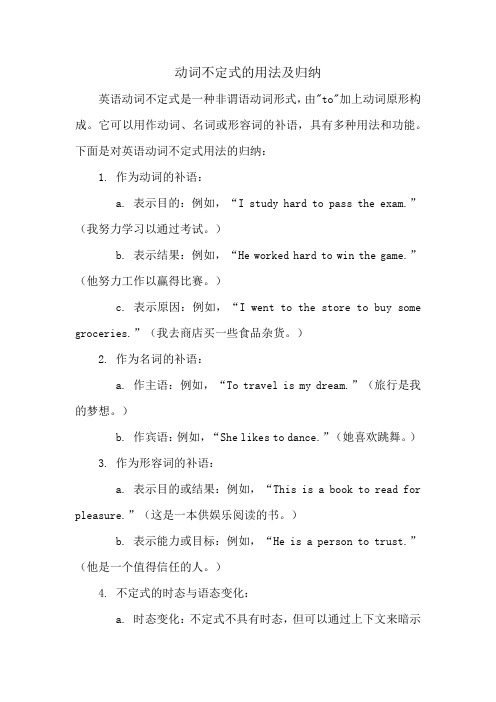
动词不定式的用法及归纳英语动词不定式是一种非谓语动词形式,由"to"加上动词原形构成。
它可以用作动词、名词或形容词的补语,具有多种用法和功能。
下面是对英语动词不定式用法的归纳:1. 作为动词的补语:a. 表示目的:例如,“I study hard to pass the exam.”(我努力学习以通过考试。
)b. 表示结果:例如,“He worked hard to win the game.”(他努力工作以赢得比赛。
)c. 表示原因:例如,“I went to the store to buy some groceries.”(我去商店买一些食品杂货。
)2. 作为名词的补语:a. 作主语:例如,“To travel is my dream.”(旅行是我的梦想。
)b. 作宾语:例如,“She likes to dance.”(她喜欢跳舞。
)3. 作为形容词的补语:a. 表示目的或结果:例如,“This is a book to read for pleasure.”(这是一本供娱乐阅读的书。
)b. 表示能力或目标:例如,“He is a person to trust.”(他是一个值得信任的人。
)4. 不定式的时态与语态变化:a. 时态变化:不定式不具有时态,但可以通过上下文来暗示时间关系。
b. 语态变化:不定式可以通过添加"be"动词的相应形式来表示被动语态。
例如,“He wants to be invited to the party.”(他希望被邀请参加派对。
)总之,不定式在句子中扮演着多种角色,并且具有多种用法和功能,具体使用取决于上下文和意图。
2019年成人高考专升本《英语》考试新大纲词汇总表
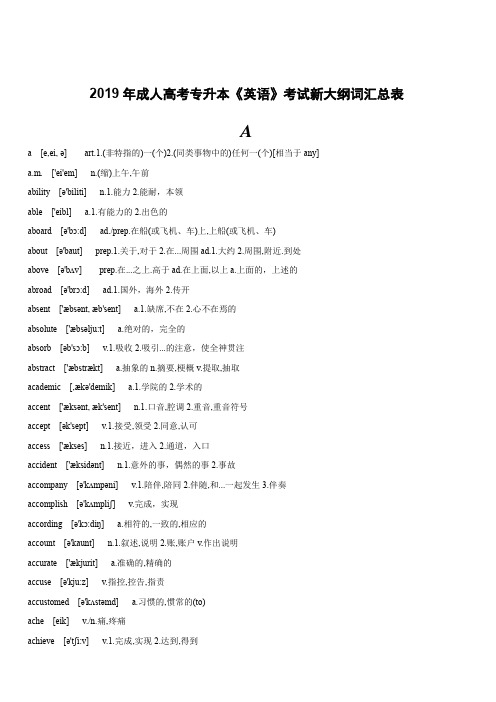
2019年成人高考专升本《英语》考试新大纲词汇总表Aa [e,ei, ə] art.1.(非特指的)一(个)2.(同类事物中的)任何一(个)[相当于any]a.m. ['ei'em] n.(缩)上午,午前ability [ə'biliti] n.1.能力2.能耐,本领able ['eibl] a.1.有能力的2.出色的aboard [ə'bɔ:d] ad./prep.在船(或飞机、车)上,上船(或飞机、车)about [ə'baut] prep.1.关于,对于2.在...周围ad.1.大约2.周围,附近.到处above [ə'bʌv] prep.在...之上.高于ad.在上面,以上a.上面的,上述的abroad [ə'brɔ:d] ad.1.国外,海外2.传开absent ['æbsənt, æb'sent] a.1.缺席,不在2.心不在焉的absolute ['æbsəlju:t] a.绝对的,完全的absorb [əb'sɔ:b] v.1.吸收2.吸引...的注意,使全神贯注abstract ['æbstrækt] a.抽象的n.摘要,梗概v.提取,抽取academic [,ækə'demik] a.1.学院的2.学术的accent ['æksənt, æk'sent] n.1.口音,腔调2.重音,重音符号accept [ək'sept] v.1.接受,领受2.同意,认可access ['ækses] n.1.接近,进入2.通道,入口accident ['æksidənt] n.1.意外的事,偶然的事2.事故accompany [ə'kʌmpəni] v.1.陪伴,陪同2.伴随,和...一起发生3.伴奏accomplish [ə'kʌmpliʃ] v.完成,实现according [ə'kɔ:diŋ] a.相符的,一致的,相应的account [ə'kaunt] n.1.叙述,说明2.账,账户v.作出说明accurate ['ækjurit] a.准确的,精确的accuse [ə'kju:z] v.指控,控告,指责accustomed [ə'kʌstəmd] a.习惯的,惯常的(to)ache [eik] v./n.痛,疼痛achieve [ə'tʃi:v] v.1.完成,实现2.达到,得到achievement [ə'tʃi:vmənt] n.1.成就,成绩2.完成,达到acquaintance [ə'kweintəns] n.1.认识,相识,了解2.相识的人,熟人acquire [ə'kwaiə] v.取得,获得,学到across [ə'krɔs] prep.1.横过,穿过2.在...的对面ad.1.横过,穿过2.宽,阔act [ækt] v.1.行为,举动2.起作用3.表演n.1.行为,动作2.法令,条例3.(一)幕action ['ækʃən] n.1.行动,行动过程2.作用active ['æktiv] a.1.活跃的,敏捷的,积极的2.在活动中的activity [æk'tiviti] n.1.活动,活跃2.行动actor ['æktə] n.男演员actress ['æktris] n.女演员actual ['æktʃuəl] a.实际的,事实上的,真实的adapt [ə'dæpt] v.1.使适应,使适合2.改编,改写add [æd] v.1.添加,增加2.把...加起来3.进一步说(或写)addition [ə'diʃən] n.1.加,加法2.附加物additional [ə'diʃənl] a.附加的,另外的address [ə'dres] n.1.地址,住址2.演说,讲话v.1.写姓名地址2.向...讲话,发表演说adequate ['ædikwit] a.1.充足的,足够的2.适当的,胜任的adjective ['ædʒiktiv] n.形容词adjust [ə' dʒʌst] v.1调节,改变...以适应2.校正,调整admire [əd'maiə] v.钦佩,赞赏,羡慕admit [əd'mit] v.1.承认,供认2.准许...进入,准许...加入adopt [ə'dɔpt] v.1.收养2.采取,采纳,采用adult [' ædʌlt] n.成年人a.成年的,充分长成的,成熟的advance [əd'va:ns] v.1.前进,向前移动2.取得进展,改进n.1.前进,进展2.预付,预支advanced [əd'va:nst] a.在前面的,先进的,高级的advantage [əd'va:ntidʒ] n.1.优点,优势,有利因素2.利益,好处adventure [əd'ventʃə] n.1.冒险,冒险活动2.奇遇adverb ['ædvə:b] n.副词advertisement [əd'və:tismənt] n.(=ad)广告advice [əd'vais] n.劝告,忠告,意见advise [əd'vaiz] v.劝告,通告,建议affair [ə'fεə] n.事件affect [ə'fekt] v.1.影响2.[在感情方面]喜欢afford [ə'fɔ:d] v.1.买得起,担负得起2.提供,给予afraid [ə'freid] a.1.害怕的,恐惧的2.犯愁的,不乐意的Africa ['æfrikə] n.非洲African ['æfrikən] a.非洲的,非洲人的n.非洲人after ['a:ftə] prep.在...以后,在...后面ad.以后,后来conj.在...以后afternoon [,a:ftə'nu:n] n.下午,午后again [ə'gein, əˈɡen,] ad.再一次,又一次against [ə'genst] prep.1.倚在,紧靠着2.逆,反(对),违反3.和...对比age [eidʒ] n.1.年龄2.时代,时期v.变老agency ['eidʒənsi] n.代理(处),代办处agent ['eidʒənt] n.代理人,代理商ago [ə'gəu] ad.以前agree [ə'gri:] v.同意,应允agreement [ə'gri:mənt] n.1.协定,协议,契约2.达成协议,同意agriculture ['ægrikʌltʃə] n.农业ahead [ə'hed] ad.在前,向前,提前aid [eid] n.1.帮助,援助2.助手,辅助手段v.帮助,援助aim [eim] v.1.把...瞄准,把...对准2.致力,旨在n.1.瞄准,对准2目标,目的air [εə] n.空气,大气,天空v.通风airline ['εəlain] n.1.航空公司2.(飞机的)航线airplane ['εəplein] n.飞机airport ['εəpɔ:t] n.机场,航空站alarm [ə'la:m] n.1.惊恐2.报警器v.1.使惊恐2.向...报警alike [ə'laik] a.同样的,相像的alive [ə'laiv] a.1.活着的2.有活力的,活跃的3.存在的all [ɔ:l] a.1.一切的,所有的2.全部的pron.全部,一切ad.完全地,都allow [ə'lau] v.1.允许,准许2. 同意给almost ['ɔ:lməust] ad.几乎,差不多alone [ə'ləun] a.1.单独的,孤独的2.独一无二的ad.1.单独地,独身地2.仅仅,只along [ə'lɔŋ]prep.沿着ad.向前aloud [ə'laud] ad.出声地,大声地alphabet ['ælfəbit] n.字母表already [ɔ:l'redi] ad.早已,已(经)also ['ɔ:lsəu] ad.1.同样地2.而且(也)although [ɔ:l'ðəu] conj.虽然,尽管altitude ['æltitju:d] n.高度,海拔altogether [,ɔ:ltə'geðə] ad.1.完全,全部地2.总起来说,总之3.总共always ['ɔ:lweiz] ad.1.总是,无例外地2.永远,始终amaze [ə'meiz] v.使大为惊奇,使惊愕America [ə'merikə] n.美洲,美国American [ə'merikən] a.1.美洲的,美国的2.美国人的n.美国人,美洲人among [ə'mʌŋ]prep.(-st)在...之中,在...之间amount [ə'maunt] n.数量,数额,总数v.1.合计,共计2.等同,接近(to)amuse [ə'mju:z] v.1.逗乐,逗笑2.给...提供娱乐an [ən,æn] art.1.(非特指的)一(个)2.(同类事物中的)任何一(个)[相当于any] analyse ['ænəlaiz] v.分析,分解analysis [ə'næləsis] n.分析,分解analyze ['ænəlaiz] v.分析,分解ancient ['einʃənt] a.古代的,古老的and [ənd,ænd] conj.1.和,与,及2.那么,则3.接连,又anger ['æŋgə] n.怒,愤怒v.使发怒,激怒angle ['æŋgl]n.1.角,角度2.角度,观点angry ['æŋgri] a.1.愤怒的,生气的2.(风浪等)狂暴的animal ['æniməl] n.动物,兽,牲畜a.动物的,野兽的announce [ə'nauns] v.1.宣布,宣告2.声称annoy [ə'nɔi] v.1.使恼怒,使烦恼2.打扰annual ['ænjuəl] a.每年的,年度的n.年鉴,年刊another [ə'nʌðə] a.1.再一个的,另一个的2.别的,不同的pron.另一个answer ['a:nsə] v.1.回答,答复2.适合,符合3.负有责任n.回答,答复,答案anxious ['æŋkʃəs] a.1.焦虑的,发愁的2.渴望的,急切的any ['eni] a.1.[否定,疑问,条件句中]任何的, 任何一种, 所有的anybody ['eni,bɔdi,'enibədi] a.1.[否定、疑问、条件句中]任何人anyhow ['enihau] ad.1.不管怎么说,无论如何2.不论用何种方法anyone ['eniwʌn] pron.任何人anything ['eniθiŋ]pron 1.[否定、疑问、条件句中]任何东西anyway ['eniwei] ad.1.不管怎么说,无论如何2.不论以何种方式anywhere ['enihwεə] ad.1.[否定、疑问、条件句中]任何地方apart [ə'pa:t] ad.1.相间隔,成距离2.分离,分开apartment [ə'pa:tmənt] n.1.[美]公寓apologize [ə'pɔlədʒaiz] v.(to for)道歉,认错apology [ə'pɔlədʒi] n.道歉,认错apparent [ə'pærənt] a.1.表面上的,貌似(真实)的2.显然的,明明白白的appear [ə'piə] v.l.出现,显露2.来到3.看来好像,似乎appearance [ə'piərəns]n.1.出现,露面2.外观,外貌appetite ['æpitait] n.1.食欲,胃口2.欲望,爱好apple ['æpl] n.苹果application [,æpli'keiʃən] n.1.申请,申请表2.应用,实施apply [ə'plai] v.1.申请,请求2.应用,运用,适用appoint [ə'pɔint] v.1.任命,委派2.约定,指定(时间、地点)appreciate [ə'pri:ʃieit] v.1.重视,欣赏2.对...作正确评价3.为...表示感激approach [ə'prəutʃ] v.靠近,接近n.1.接近2.途径,入门3.方式,方法appropriate [ə'prəupriət,ə'prəuprieit] 适当的,恰当的,相称的approve [ə'pru:v] v.1.赞成,同意,称许2.批准,核准approximate [ə'prɔksimit] a.近似的,大约的v.(to)近似,接近April ['eiprəl] n.四月area ['εəriə] n.1.面积2.地区,地域3.领域,范围argue ['a:gju:] v.1.争论,争辩2.提出理由,(企图)证明argument ['a:gjumənt] n.1.争论,争辩2.理由,论据arise [ə'raiz] v.1.出现,发生2.由...引起,起源于arithmetic [ə'riθmətik] n.算术arm [a:m] n.1.臂,臂状物2.[pl.] n.武器, 兵种army ['a:mi] n.1.军队,军2.大群,大批around [ə'raund] ad.1.在周围,在附近2.到处3.大约prep.在...四周,在...附近arouse [ə'rauz] v.1.引起,激起,唤起2.唤醒arrange [ə'reindʒ] v.1.安排,筹划2.整理,使有条理,排列,布置arrest [ə'rest] v./n.逮捕,拘留arrival [ə'raivəl] n.1.到达,到来2.到达者,到达物arrive [ə'raiv] v.1.到来,到达2.来临3.(at)到达,达成arrow ['ærəu] n.1.箭,箭状物2.箭头符号art [a:t] n.1.美术,艺术2.技术,技艺3.[pl.]文科article ['a:tikl] n.1.文章,论文2.条款,条文3.物品4.冠词artificial [,a:ti'fiʃəl] a.1.人工的,人造的,人为的2.假的,矫揉造作的artist ['a:tist] n.艺术家,美术家as [əz,æz] conj.1.当...时,在...的同时2.如同...那样,以...的方式,像...一样3.因为,由于4.以致于prep.作为,当作ad.同样地,一样地ash [æʃ] n.灰,灰烬Asia ['eiʃə] n.亚洲Asian ['eiʃən] a.亚洲的,亚洲人的n.亚洲人aside [ə'said] ad.在旁边,到(或向)一边ask [a:sk] v.1.问,询问2.请求,要求3.邀请,约请asleep [ə'sli:p] a. 睡着的aspect ['æspekt] n.1.方面2.外表,面貌assemble [ə'sembl] v.1.集合,召集2.装配assign [ə'sain] vt.1.(to)指派,选派2.分配,布置(作业) 3.指定(时间,地点等)assignment [ə'sainmənt] n.1.(分派的)任务,(指定的)作业2.分配,批派assist [ə'sist] v.帮助,协助assistant [ə'sistənt] n.1.助手,助理2.助教a.助理的,辅助的associate [ə'səuʃieit] v.1.把...联系在一起,使结合2.交往n.伙伴,合伙人a.副的association [ə,səuʃi'eiʃən] n.1.协会,社团2.联合,结合,交往assume [ə'sju:m] v.1.假定,假设2.承担3.呈现,采取assure [ə'ʃuə] v.1.使确信,使放心2向...保证astonish [əs'tɔniʃ] v.使惊讶astronaut ['æstrənɔ:t] n.宇航员as...as 像,如同,与...一样at [æt,ət] prep.1.在...里,在...上2.在...时刻3.向,朝4.[表示价格、速度等]Atlantic [ət'læntik] a.大西洋的n.[the~]atmosphere ['ætməs,fiə] n.1.大气,大气层2.空气3.气氛4.大气压atom ['ætəm] n.1.原子2.微粒,微量attach [ə'tætʃ] v.1.系,贴,装,连接2.使成为一部分,使附属3.使依恋attack [ə'tæk] v.1.攻击,进攻,抨击2.(风雨、疾病等)侵袭n.1.攻击,进攻,抨击2.(疾病的)突然发作attempt [ə'tempt] v./n.企图,试图attend [ə'tend] v.1.出席,参加2.照料,护理3.(to)专心于,致力于attention [ə'tenʃən] n.注意,留心attitude ['ætitju:d] n.1.态度,看法2.姿势attract [ə'trækt] v.吸引,引起...的注意,有吸引力attractive [ə'træktiv] a.有吸引力的,引起注意的audience ['ɔ:djəns] n.听众,观众,读者August ['ɔ:gəst] n.八月aunt [a:nt] n.伯母,婶母,姑母,姨母,舅母Australia [ɔ'streiljə] n.澳大利亚,澳洲Australian [ɔ'streiljən] a.1.澳大利亚(人)的2.澳洲区的n.澳大利亚人author ['ɔ:θə] n.作者authority [ɔ:'θɔriti] n.1.[pl.]权威;2. 权力3. 官方4. 专家5. 行政管理机构automatic [,ɔ:tə'mætik] a.自动的automobile ['ɔ:təməubi:l] n.(=auto)汽车autumn ['ɔ:təm] n.秋天,秋季available [ə'veiləbl] a.1.可利用的,可获得的2.可取得联系的,可接见的avenue ['ævənju:,'ævinju:] n.林荫道,大街average ['ævəridʒ] n.平均数,平均a.平常的,通常的v.平均avoid [ə'vɔid] v.避免,避开awake [ə'weik] a.醒着的v.唤醒,使觉醒award [ə'wɔ:d] n.奖,奖品,奖状v.授予,给予aware [ə'wεə] 意识到,知道的away [ə'wei] ad.远离,离开awful ['ɔ:ful] a.1.使人产生敬畏之心,可怕的2.极度的,极坏的awkward ['ɔ:kwəd] a.1.粗笨的,笨拙的2.尴尬的,棘手的3.使用不便的BB.C. ['bi:'si:] n.(缩)公元前=before Christbaby ['beibi] n.婴儿back [bæk] ad.1.向后2.回原处,回复原状3.还,回n.背,背面,后面a.背后的,后面的v.后退,倒退2.支持background ['bækgraund] n.背景backward ['bækwəd] ad.向后,朝反方向a.1.向后的,倒的2.落后的,进步慢的bad [bæd] a.1.坏的,不好的2.严重的,厉害的3.腐败的badly ['bædli] ad.1.坏,差,拙劣地2.严重地,厉害地bag [bæg] n.1.袋2.钱包baggage ['bægidʒ] n.行李bake [beik] v.1.烘,焙,烤2.烧硬,烘干(砖块、陶器等)balance ['bæləns] v.1.使平衡2.称n.1.天平,称2.平衡,均衡3.结存,结欠ball [bɔ:l] v.1.球,球状物2.(盛大,正式的)舞会balloon [bə'lu:n] n.气球banana [bə'na:nə] n.香蕉ba nk [bæŋk]n.1.银行,库存2.岸,堤bar [ba:] n.1.酒吧间,售酒(或食物、饮料)的柜台2.条,块,杆3.栅,栏v.阻止,拦阻barber ['ba:bə] n.理发师bare [bεə] a.1.赤裸的,不穿衣服的,不戴帽的2.光秃秃的,无遮盖的3.仅仅的,光是的v.露出,暴露bargain ['ba:gin] n.1.交易2.特价商品v.讨价还价base [beis] n.1.基,底2.基础,根据v.(on)把...建立在...基础上basic ['beisik] a.基本的,基础的basin ['beisn] n.1.盆,脸盆2.盆地basis ['beisis] n.基础,根据basket ['ba:skit] n.篮,篓basketball ['ba:skitbɔ:l] n.篮球bat [bæt] n.1.球拍2.蝙蝠bath [ba:θ]n.1.浴,洗澡2.浴缸v.[英]洗澡bathe [beið] v.1.[美] 沐浴, 洗澡, (光线)充满bathroom ['ba:θrum,'ba:θru:m]n.1.浴室2.盥洗室battery ['bætəri] n.电池(组)battle ['bætl] n.战役,战斗,斗争v.作战,搏斗bay [bei] n.1.(海或湖泊的)湾2.山脉的低凹处be [bi:,bi] v.1.是,就是2.表示,意味着3.等于,值4.成为,变成5.在,存在aux.v.1.[与动词的现在分词连用,构成各种进行时态]beach [bi:tʃ] n.海滩,湖滩,河滩beam [bi:m] n.1.(光线的)束,柱2.横梁bear [bεə] n.熊v.1.忍受,容忍2.负担,承担3.结(果实),生(孩子)beard [biəd] n.胡须beast [bi:st] n.1.兽,野兽,牲畜2.凶残的人,令人厌憎的人beat [bi:t] v.1.(接连地)打,击2.(心脏等)跳动3.打败,战胜n.1.(心脏等的)跳(声) 2.有节奏的敲击(声)beautiful ['bju:təful] a.美的,美丽的beauty ['bju:ti] n.1.美,美丽2.美人,美的东西because [bi'kɔz]conj.因为become [bi'kʌm] v.变成,成为,开始变得bed [bed] n.1.床,床位2.(苗)床,坛3.(河)床,(湖、海的)底bee [bi:] n.蜜蜂beef [bi:f] n.牛肉beer [biə] n.啤酒before [bi'fɔ:] prep.1.(指时间)在...以前2.(指位置)在...前面3.(指顺序、重要性等)在...之前,先于conj.在...以前ad.1.较早2.以前,以往beg [beg] v.1.乞求,乞讨2.恳求,请求begin [bi'gin] v.开始beginning [bi'giniŋ]n.开始,开端behalf [bi'ha:f] n.利益behave [bi'heiv] v.1.举止端正,表现2.(机器等)运转behaviour [bi'heivjə] (=behavior)n.1.行为,举止2.(机器等)运转情况behind [bi'haind] prep.在...的背后,(遗留)在...后面,落后于ad.在背后,向后,落在后面being ['bi:iŋ]n.1.存在,生存2.生物,人belief [bi'li:f] n.1.相信,信任,信赖2.信念3.信仰4.信条believe [bi'li:v] v.1.相信,笃信,信任2.认为,猜想bell [bel] n.钟,铃belong [bi'lɔŋ]v.1.(在分类上)属,应归入2.(to)(在所有权,关系等方面)属于below [bi'ləu] prep.1.[指位置]在…下面belt [belt] n.腰带,皮带bench [bentʃ] n.长凳,长椅bend [bend] v.使弯曲n.弯曲,弯曲处beneath [bi'ni:θ]prep.在...下面,在...底下ad.在下方benefit ['benifit] n.益处,好处v.有益于,得益beside [bi'said] prep.1.在...旁边,在...附近2.和......相比besides [bi'saidz] ad.而且,此外prep.除...之外(还)best [best] a.最好的ad.最好,最bet [bet] v.打赌,以...打赌,与...打赌n.1.打赌2.赌金,赌注better ['betə] a.较好的,更好的ad.更好地between [bi'twi:n] prep.在...(两者)之间beyond [bi'jɔnd] prep.1.在(或向)...的那边,远于2.迟于3.超出ad.在更远处Bible ['baibl] n.《圣经》bicycle ['baisikl] n.自行车big [big] a.大的,巨大的2.重要的,重大的bike [baik] n.(口)自行车bill [bil] n.1.账单2.单子,清单3.纸币,钞票billion ['biljən] num.1.[美、法]十亿bind [baind] v.捆,绑,捆扎biology [bai'ɔlədʒi] n.生物学bird [bə:d] n.鸟,禽birth [bə:θ]n.1.出生,分娩2.出身,家世,血统3.起源,根源birthday ['bə:θdei]n.生日bit [bit] n.一点,一些,一片bite [bait] (过去式)bit v./n.咬,叮bitter ['bitə] a.1.痛苦的2.有苦味的black [blæk] a.1.黑色的2.黑暗的n.1.黑色2.黑人blackboard ['blækbɔ:d] n.黑板blame [bleim] v.1.指责,责备,责怪2.(on,onto)归咎于,把...归咎于n.1.(过错、事故等的)责任2.指责,责备blank [blæŋk] a.1.空白的,空着的2.茫然的,无表情的n.1.空白2.空白表格,空白处blanket ['blæŋkit]n.毛毯,毯子blind [blaind] a.1.瞎的,失明的2.盲目的v.使失明block [blɔk] n.1.街区,街段2.大块(木料或石料、金属、冰)3.障碍物,阻碍物v.堵塞,阻塞blood [blʌd] n.1.血,血液2.血统,门第blow [bləu] v.1.吹,吹动2.吹气3.吹响4.爆炸n.一击,打击,捶打blue [blu:] a.1.蓝色的2.(皮肤等)青灰色的3.沮丧的,忧郁的n.蓝色board [bɔ:d] n.1.板,木板,纸板2.委员会,董事会3.(指包饭)伙食4.船舷v.上(船、车、飞机)boast [bəust] v.1.自夸,夸耀,吹嘘2.以拥有...而自豪n.自吹自擂,自夸的话boat [bəut] n.船,小船body ['bɔdi] n.1.身体,躯体,主体2.尸体3.物体4.(一)群,一批boil [bɔil] v.沸腾,煮沸bold [bəuld] a.1.勇敢的,无畏的2.冒失的3.粗体,黑体的bomb [bɔm] n.炸弹v.轰炸,投弹bond [bɔnd] n.1.联结,联系2.粘结剂,粘合剂3.公债,债券bone [bəun] n.骨,骨骼book [buk] n.书,书籍v.预计,订(戏票、车票、房间等)boot [bu:t] n.靴border ['bɔ:də] n.1.边,边缘,界线2.边界,边境v.1.与...接壤,毗邻2.接近bore [bɔ:] v.1.使厌烦,使厌倦2.钻(孔),凿(井),挖(通道) n.令人讨厌的人(或事)born [bɔ:n] (bear的过去分词) a.1.出生的,产生的2.天生的borrow ['bɔrəu] v.借,借入boss [bɔs] n.老板,上司v.指挥,发号施令both [bəuθ]pron.两者(都),双方(都) a.两...(都),两个...(都)bother ['bɔðə] v.1.打扰,麻烦2.担心,烦恼n.烦恼,焦急bottle ['bɔtl] n.瓶bottom ['bɔtəm] n.底,底部bound [baund] (bind的过去式和过去分词) a.1.一定的,必然的2.受约束的,有义务的3.(for, to)准备到...去的,开往(或驶往)...的v.跳跃,弹回bowl [bəul] n.碗,钵box [bɔks] n.1.箱,盒2.包厢v.拳击boy [bɔi] n.男孩brain [brein] n.1.脑,[pl.]智力branch [bra:ntʃ] n.1.树枝,分枝2.(机构的)分部,分号3.(学科的)分科,分支brand [brænd] n.商标,(商品的)牌子v.1.打烙印于,以烙铁打(标记)2.把...铭刻,铭刻于brave [breiv] a.勇敢的bread [bred] n.面包break [breik] v.1.打破,使碎裂2.损坏,弄坏3.破坏,违反4.中止,中断n.(课间、工间)休息时间breakfast ['brekfəst] n.早餐v.进早餐breath [breθ]n.气息,呼吸breathe [bri:ð] v.呼吸brick [brik] n.1.砖2.砖块状物bridge [bridʒ] n.桥,桥梁brief [bri:f] a.简短的,简洁的v.向...作简要的介绍bright [brait] a.1.明亮的,晴朗的2.聪敏的,机灵的3.欢快的brilliant ['briljənt] a.1.光辉的,灿烂的2.卓越的,杰出的bring [briŋ]v.1.带来,拿来2.引起,导致Britain ['britən] n.不列颠,英国British ['britiʃ] a.(大)不列颠(人)的,英国(人)的n.[the~]broad [brɔ:d] a.1.宽的,阔的,广阔的2.广泛的3.宽容的broadcast ['brɔ:dka:st] n./v.广播,播音brother ['brʌðə] n.兄弟brown [braun] n./a.棕色(的),褐色(的)brush [brʌʃ] n.1.刷子,毛刷2.画笔v.刷,写,画,掸,拂,擦build [bild] v.1.建筑,建造2.建立3.增强,增进building ['bildiŋ]n.1.建筑物,大楼2.建筑bunch [bʌntʃ] n.束,捆,串burden ['bə:dən] n.担子,负担burn [bə:n] v.1.燃烧,烧着2.烧毁3.灼伤n.烧伤,灼伤burst [bə:st] v./n.爆炸,爆裂bury ['beri] v.1.埋葬,葬2.掩埋,埋藏bus [bʌs] n.公共汽车bush [buʃ] n.灌木,灌木丛business ['biznis] n.1.商业,生意2.事务busy ['bizi] a.忙的,忙碌的,繁忙的but [bʌt] conj.但是,可是,然而prep.[常用于nobody, all, who等词后面]除…以外butter ['bʌtə] n.黄油,奶油v.涂黄油于...上button ['bʌtən] n.1.纽扣2.按钮,开关v.扣上,扣紧v.买,购买by [bai] prep.1.在...旁边,靠近2.到(某时)之前,不迟于3.被,由4.靠,通过,以5.根据,按照ad.在近旁,经过Ccabbage ['kæbidʒ] n.洋白菜,卷心菜cable ['keibl] n.1.索,缆2.电缆,海底电缆3.电报v.拍电报cake [keik] n.饼,糕,蛋糕calculate ['kælkjuleit] v.1.计算,核算2.计划,打算calendar ['kælində] n.日历,月历call [kɔ:l] v.1.叫做,称为2.叫,喊3.打电话给n.1.呼叫,喊叫2.访问3.(一次)电话,通电话calm [ka:m] a.1.平静的,无风的2.镇静的,镇定的v.使平静,使镇定camel ['kæməl] n.骆驼camera ['kæmərə] n.照相机camp [kæmp] n.野营,营地,账篷v.设营,宿营campaign [kæm'pein] n.战役,运动campus ['kæmpəs] n.(大学)校园can [kæn,kən] aux.v.1.能,会2.可以3.可能n.罐头Canada ['kænədə] n.加拿大Canadian [kə'neidjən] a.1.加拿大的2.加拿大人的n.加拿大人canal [kə'næl] n. 运河;水道;管道;灌溉水渠cancel ['kænsəl] n.1.取消,撤消2.删去,划掉cancer ['kænsə] n.癌candidate ['kændidit] n.1.候选人,候补者2.投考者,申请求职者candle ['kændl] n.蜡烛cap [kæp] n.1.帽子,便帽2.帽状物,盖,套,罩capable ['keipəbl] a.有能力的,有才能的capacity [kə'pæsiti] n.1.容量,容积2.能力capital ['kæpitl] n.1.资本,资金2.首都3.大写字母a.主要的,基本的captain ['kæptin] n.1.领袖,首领2.船长,舰长3.队长v.率领,指挥capture ['kæptʃə] v./n.捕获,俘获car [ka:] n.汽车,轿车carbon ['ka:bən] n.碳card [ka:d] n.卡,卡片,名片,信用卡care [kεə] v.1.关心,介意2.喜欢,愿意n.1.小心,注意2.照顾,关怀career [kə'riə] n.生涯,职业,经历careful ['kεəful] a.小心的,仔细的careless ['kεəlis] a.粗心的,疏忽的cargo ['ka:gəu] n.船货,货物carpet ['ka:pit] n.地毯carry ['kæri] v.1.运送,运载,携带2.传送,输送cart [ka:t] n.大车,手推车case [keis] n.1.情况,事实2.病例3.案件4.箱,盒,容器cash [kæʃ] n.钱,现款cassette [kə'set,kæ'set] n.盒式录音带cast [ka:st] v.1.投,扔,抛2.浇铸,铸造castle ['ka:sl] n.城堡cat [kæt] n.猫catalog ['kætəlɔ:g] (=catalogue)n.目录,目录簿(或册)v.1.将...编入目录2.将(书籍、资料等)编目分类catch [kætʃ] v.1.捉住,逮住,抓住2.赶上,追上3.听清楚,领会4.染上,感染cattle ['kætl] n.牛cause [kɔ:z] n.1.原因,起因,理由2.事业(奋斗的)目标v.使产生,引起cave [keiv] n.洞穴,山洞cease [si:s] v./n.停止,中止ceiling ['si:liŋ]n.天花板celebrate ['selibreit] v.庆祝cell [sel] n.1.细胞2.小室3.电池cent [sent] n.1.分,分币2.百(仅用于百分比per cent一词中)centimeter ['senti,mi:tə] n.厘米,公分central ['sentrəl] a.1.中央的,中心的2.主要的,起支配作用的centre ['sentə] n.中心,中央v.集中century ['sentʃuri]n.世纪,百年ceremony ['seriməni]n.1.典礼, 仪式2.礼节,礼仪certain ['sə:tən] a.1.确实的,无疑的2.肯定的,必然的3.某,某一certainly ['sə:tənli] ad.1.必定,一定2.当然,行certificate [sə'tifikit] n.证(明)书,执照chain [tʃein] n.1.链,链条2.一连串,连串v.用链条拴住chair [tʃεə] n.椅子chairman ['tʃεəmən] n.主席,议长,会长chalk [tʃɔ:k] n.白垩,粉笔challenge ['tʃælindʒ] n.挑战v.向...挑战champion ['tʃæmpjən] n.冠军,得一等奖者chance [tʃa:ns] n.1.机会,机遇2.可能性,偶然性3.机缘,幸运v.碰巧,偶然发生change [tʃeindʒ] n.1.改变,变化2.找头,零钱v.1.改变,变化2.换,兑换channel ['tʃænl] n.1.海峡,水道,航道2.渠道3.频道chapter ['tʃæptə] n.章,回,篇character ['kæriktə] n.1.性格,品质2.特性,特征3.人物,角色4.(书写或印刷)符号,(汉)字characteristic [,kæriktə'ristik] a.特有的,典型的n.特性,特征charge [tʃa:dʒ] v.1.索价,要...支付2.控告,指控3.充电n.1.价钱,费用2.控告,指控3.电荷,充电chart [tʃa:t] n.图,图表cheap [tʃi:p] a.1.廉价的,便宜的2.劣质的,低劣的cheat [tʃi:t] v.欺骗,欺诈行为n.1.欺骗,欺诈行为2.骗子check [tʃek] v.1.检查,核对2.制止n.1.检查,核对2.支票,账单cheer [tʃiə] v.1.使振奋,使高兴2.欢呼,喝彩n.振奋,欢呼,喝彩cheerful ['tʃiəful] a.愉快的,高兴的chemical ['kemikəl] a.化学的n.化学制品chemist ['kemist] n.化学家,药剂师chemistry ['kemistri] n.化学cheque [tʃek] n.支票chest [tʃest] n.1.胸,胸腔2.柜子,橱chicken ['tʃikin] n.小鸡,鸡肉chief [tʃi:f] n.首领a.首要的child [tʃaild] n.小孩,儿童childhood ['tʃaildhud] n.童年,幼年chin [tʃin] n.下巴,颏China ['tʃainə] n.1.中国2.[china]Chinese [`tʃai'ni:z] a.1.中国的,中国人的2.中国话的,汉语的n.1.中国人2.中国话,汉语chocolate ['tʃɔkəlit] n.1.巧克力,巧克力糖2.深褐色choice [tʃɔis] n.1.选择,抉择2.供选择的品种a.上等的,精选的choose [tʃu:z] v.选择,挑选Christian ['kristjən] n.基督教徒Christmas ['krisməs] n.圣诞节church [tʃə:tʃ] n.1.教堂cigarette [,sigə'ret] n.(=cigaret)香烟,纸烟cinema ['sinimə] n.1.电影2.电影院circle ['sə:kl] n.1.圆,圆周2.圈子,阶层v.环绕,旋转circuit ['sə:kit] n.1.电路,线路2.环行,巡回circumstance ['sə:kəmstəns] n.1.环境,条件,情况2.[pl.]客观形势citizen ['sitizn] n.1.公民2.市民, 城镇居民city ['siti] n.城市,都市civil ['sivl] a.1.公民的,公民个人的2.国内的,公民间的3.文明的,有教养的civilization [,sivilai'zeiʃən] n.文明,文化claim [kleim] v.1.声称,自称,主张2.对...提出要求,索取n.要求,主张,断言clap [klæp] v.拍手,(用手)拍,击n.拍手,鼓掌class [kla:s] n.1.班级2.课,上课3.阶级,社会等级,级别4.种类,门类classical ['klæsikəl] a.古典的,经典的classify ['klæsifai] v.把...分类,把...分级classmate ['kla:smeit] n.同班同学classroom ['kla:srum] n.教室,课堂clean [kli:n] a.清洁的,干净的v.把...弄干净,除去...的污垢clear [kliə] a.1.清晰的,清楚的2.晴朗的3.畅通的,无阻的ad.清晰地,清楚地v.1.使清澈,使明净2.打扫,清除clerk [kla:k] n.店员,办事员,职员clever ['klevə] a.聪明的,机灵的climate ['klaimit] n.气候climb [klaim] v./n.攀登,爬clock [klɔk] n.钟close [kləuz,kləus] v. [kləuz]1.关,关闭2.结束,终止a.[kləus]1.密切的,亲密的2.近的,接近的3.严密的4.关闭的cloth [klɔθ]n.1.布,织物,衣料2.(一块)抹布clothe [kləuð] v.给...穿衣服,给...提供衣服clothes [kləuðz] n.衣服clothing ['kləuðiŋ]n.服装,衣着cloud [klaud] n.1.云2.遮暗物,阴影3.一大群cloudy [klaudi] a.1.多云的2.云一般的3.模糊不清的club [klʌb] n.1.俱乐部,夜总会2.棍棒,球棒clue [klu:] n.线索,提示coach [kəutʃ] n.1.长途公共汽车2.(铁路)旅客车厢3.教练v.训练,指导coal [kəul] n.煤,煤块coarse [kɔ:s] a.1.粗的,粗糙的2.粗劣的3.粗俗的coat [kəut] n.1.上衣,外套2.表皮3.层覆盖物v.涂上,盖上cock [kɔk] n.1.公鸡2.龙头,旋塞,阀门coffee ['kɔfi] n.咖啡coin [kɔin] n.硬币,钱币v.铸币cold [kəuld] a.1.冷的,寒冷的2.冷淡的n.1.冷,寒冷2.伤风,感冒collar ['kɔlə] n.1.衣领,领子2.(狗等的)项圈colleague ['kɔli:g] n.同事,同僚collect [kə'lekt] v.1.收集,聚集2.取,接3.收(账、税等)collective [kə'lektiv] a.集体的,共同的n.团体,集体college ['kɔlidʒ] n.大学,学院colour ['kʌlə] n.1.颜色,彩色2.颜料v.给...着色,染色column ['kɔləm] n.1.柱,圆柱2.柱形物3.(数)列4.栏,专栏(文章)comb [kəum] n.梳子v.梳理combine [kəm'bain] n.结合,联合,化合come [kʌm] v.1.来,来到,来临2.出现于3.变成,成为comfort ['kʌmfət] n.安慰,舒适v.安慰,慰问,使舒适comfortable ['kʌmfətəbl] a.舒适的,舒服的,舒坦的command [kə'ma:nd] v./n.命令,指挥,控制n.掌握,运用能力comment ['kɔment] n./v.注解,评论commerce ['kɔmə:s] n.商业,贸易commercial [kə'mə:ʃəl] a.商业的,商务的commit [kə'mit] v.犯(罪),干(坏事)committee [kə'miti] n.委员会common ['kɔmən] a.1.平常的,普通的2.共同的communicate [kə'mju:nikeit] v.1.传达,传播2.交流,通讯,交际communication [kə,mju:ni'keiʃən] n.1.传达,通讯,交流2.(pl.)通讯系统,交通系统communism ['kɔmjunizəm] n.共产主义communist ['kɔmjunist] n.共产主义者,共产党员a.共产主义的,共产党的community [kə'mju:niti] n.1.社区,社会2.共同体company ['kʌmpəni] n.1.公司,商号2.同伴,陪伴comparative [kəm'pærətiv] 比较的,相对的compare [kəm'pεə] v.比较,对照compass ['kʌmpəs] n.1.罗盘,罗盘仪2.[pl.]圆规compete [kəm'pi:t] v.竞争,比赛competition [,kɔmpi'tiʃən]n.竞争,比赛complain [kəm'plein] v.抱怨,发牢骚complete [kəm'pli:t] a.完整的,完全的,圆满的v.完成,使完美complex ['kɔmpleks] a.1.组合的2.复杂的n.复合体complicated ['kɔmplikeitid] a.复杂的,难懂的compose [kəm'pəuz] v.1.组成,构成2.创作(音乐,文字作品),为...谱曲composition [,kɔmpə'ziʃən] n.1.构成,组成,成分2.作文,作品,乐曲3.写作,作曲compound [kəm'paund,'kɔmpaund] n.化合物,复合物a.得分的,化合的comprehension [,kɔmpri'henʃən] n.1.理解(力) 2.理解力测验comprehensive [`kɔmpri'hensiv] 广泛的,综合的computer [kɔm'pju:tə] n.计算机,电脑comrade ['kɔmrid,'kɔmreid] n.同志,同伴,朋友concentrate ['kɔnsəntreit] v.1.集中,专心2.集合,聚集3.浓缩n.浓缩物concept ['kɔnsept] n.概念,观念,思想concern [kən'sə:n] n.1.关心,挂念2.关系,关联v.1.涉及,有关于2.关心,挂念concerning [kən'sə:niŋ]prep.关于concert ['kɔnsət] n.音乐会,演奏会conclude [kən'klu:d] v.1.推断出,推论出2.作出(最后)决定3.结束,终止conclusion [kən'klu:ʒən] n.1.结论,推论2.结束,终结condition [kən'diʃən] n.1.状况,状态2.[pl.]环境conduct ['kɔndʌkt] v.1.处理,管理2.指挥3.传导,传(热,电)n.举止,行为conference ['kɔnfərəns] n.(正式)会议confess [kən'fes] v.坦白,供认,承认confidence ['kɔnfidəns] n.1.信任,信心,自信2.私下里说的话confident ['kɔnfidənt] a.确信的,自信的confirm [kən'fə:m] v.1.证实,肯定,确定2.巩固,加强3.批准,确认conflict ['kɔnflikt,kən'flikt] n./v.冲突,抵触,战斗confuse [kən'fju:z] v.使混乱,混淆congratulate [kən'grætjuleit]v.祝贺,向...道喜congress ['kɔŋgres]n.1.代表大会2.国会,议会connect [kə'nekt] v.连接,连结,联系conquer ['kɔŋkə]v.1.攻克,征服2.破除,克服conscious ['kɔnʃəs] a.1.意识到的,自觉的2.有意的,存心的3.神志清醒的consent [kən'sent] n.同意,赞成v.(to)同意,赞成consequence ['kɔnsikwəns] n.结果,后果consequently ['kɔnsikwəntli]ad.所以,因此conservation [,kɔnsə'veiʃən] n.1.保存,保护2.守恒,不灭conservative [kən'sə:vətiv] a.保守的,守旧的,传统的n.保守的人,反对进步的人consider [kən'sidə] v.1.认为,把...看作2.考虑,细想3.关心,考虑到considerable [kən'sidərəbl] a.1.相当大的2.值得考虑的consist [kən'sist] v.1.(of)组成,构成2.(in)存于,存在于constitution [,kɔnsti'tju:ʃən] n.1.章程,宪法2.体质,素质3.构造construction [kən'strʌkʃən] n.1.建造,构造2.建造物,建筑物consult [kən'sʌlt] v.1.请教,向...咨询,找...商量2.查阅,查看consume [kən'sju:m] v.消耗,花费contact ['kɔntækt] v./n.接触,联系,交往contain [kən'tein] v.1.包含,容纳2.相当于,折合content ['kɔntent] n.1.[pl]内容contest [kən'test,'kɔntest] n. ['kɔntest]竞争,竞赛,比赛v. [kən'test]竞赛,比赛,争论continent ['kɔntinənt] n.大陆,洲continual [kən'tinjuəl] a.从不间断的,不停的continue [kən'tinju:] v.延伸,继续,坚持下去continuous [kən'tinjuəs] a.不断延伸的,连续不断的contract ['kɔntrækt,kən'trækt] n. ['kɔntrækt](承包)合同.(承包)契约v.[kən'trækt]1.订合同,订契约2.使缩小,使收缩contrary ['kɔntrəri] a.相反的,对抗的n.相反,相反事物,对立面contrast ['kɔntra:st,kən'tra:st] v.['kən'tra:st]1.对比,对照2.形成对比,对比之下显出区别n.['kɔntra:st]对比,对照v.形成对比,对比之下显出区别contribute [kən'tribju:t] v.1.捐献,捐助,贡献2.投稿control [kən'trəul] v./n.1.控制,支配2.克制,抑制convenient [kən'vi:njənt] a.省力的,方便的conversation [,kɔnvə'seiʃən] n.(友好,随便的)谈话,会话convey [kən'vei] v.1.传送,传达,表达2.运送,输送convince [kən'vins] v.使确信,使信服cook [kuk] v.烹调,煮,烧n.厨子,炊事员cool [ku:l] a.1.凉的,凉快的2.冷静的,冷淡的v.使变凉,使冷静下来cooperate [kəu'ɔpəreit] vi.合作,协作,配合cope [kəup] v.(with)1.竞争,对抗2.对付,妥善处理copper ['kɔpə] n.1.铜2.铜制品,铜币copy ['kɔpi] n.1.抄件,副本2.(一)本,(一)份v.抄写,复印,临摹core [kɔ:] n.1.果心2.核心,最重要部分,要点corn [kɔ:n] n.谷物,小麦,玉米corner ['kɔ:nə] n.1.角,墙角2.街角,弯角corporation [,kɔ:pə'reiʃən] n.公司correct [kə'rekt] a.1.正确的,对的2.合适的,得体的v.改正,纠正correspond [,kɔri'spɔnd] v.1.(to, with)相符合,成一致2.(to)相当,相类似3.(with)通信corresponding [,kɔri'spɔndiŋ] a.1.相应的,相当的,对等的2.符合的,一致的,相同的cost [kɔst] n.价格,成本,费用v.价钱为,(使)花费cottage ['kɔtidʒ] n.小屋,村舍cotton ['kɔtən]n.1.棉,棉花2.棉线,棉纱cough [kɔf] v./n.咳嗽could [kud,kəd] aux.v.1.can的过去式2.[含有不确定或婉转、谦逊的意味]能,可以council ['kaunsəl]n.委员会,理事count [kaunt] v.1.数到,点...的数目2.计算,把...算入n.记数,计算,总数counter ['kauntə] n.1.柜台2.计数器vt.反对,反抗ad.反方向地,对立地country ['kʌntri] n.1.国家2.乡下,农村countryside ['kʌntrisaid] n.农村,乡下couple ['kʌpl] n.1.夫妻2.一对,一双3.两三(个),一些v.连接,结合courage ['kʌridʒ] n.勇气,胆识course [kɔ:s] n.1.课程,教程2.过程,进程3.(一)道(菜)court [kɔ:t] n.1.法庭,法院2.球场3.院子cousin ['kʌzn] n.堂(或表)兄弟,堂(或表)姊妹cover ['kʌvə] v.1.盖,覆盖2.包括,涉及n.(书的)封面,盖子,套子cow [kau] n.母牛,奶牛crash [kræʃ] n./v.碰,撞,坠落,坠毁n.破裂声,哗啦声crazy ['kreizi] a.1.发疯的,荒唐的,古怪的2.(about)狂热爱好的,着迷的cream [kri:m] n.1.奶油,(含)奶油食品,奶油状物2.奶油色create [kri'eit] v.1.创造,创作2.引起,产生creature ['kri:tʃə] n.生物,动物,人credit ['kredit] n.1.信用贷款,赊欠2.信用,信誉3.荣誉,光荣,功劳4.学分v.1.记入贷方2.信任crew [kru:] n.全体船员,全体机务人员,一队(或一班、一组)工作人员crime [kraim] n.罪,罪行,犯罪criminal ['kriminl] n.罪犯,犯人a.犯罪的,刑事的crisis ['kraisis] n.危机,危急关头,决定性时刻critical ['kritikəl] a.1.批评的,批判的2.决定性的,关键性的3.临界的criticism ['kritisizəm] n.批评,批判,评论criticize ['kritisaiz] v.1.批评,批判,指责2.评论,评价crop [krɔp] n.作物,庄稼cross [krɔs] v.1.穿过,越过2.(使)交叉,(使)相交n.十字形crowd [kraud] n.群,人群,群众v.群集;拥挤,挤满crown [kraun] n.王冠,冕crude [kru:d] a.1.简陋的,粗糙的2.天然的,未加工的3.粗鲁的,粗俗的cruel ['kru:əl] a.残酷的,残忍的crystal ['kristəl] n.1.水晶,石英晶体2.晶粒a.清澈透明的,水晶制的,晶体的cube [kju:b] n.1.立方形,立方体2.立方,三次幂culture ['kʌltʃə] n.1.文化,文明2.教养,修养cup [kʌp] n.1.杯子2.(一)杯(的容量)3.优胜杯,奖杯cure [kjuə] v.1.治愈,治好2.消除,改正n.1.治愈,治疗,疗法2.药curiosity [,kjuəri'ɔsiti] n.好奇(心)curious ['kjuəriəs] a.好奇的current ['kʌrənt] n.1.(空气,水等的)流,潮流,流速2.电流3.趋势,倾向a.1.现时的,当前的2.通行的,流行的curse [kə:s] n./v.诅咒,咒骂curtain ['kə:tən] n.窗帘,门帘custom ['kʌstəm] n.1.习惯,风俗,惯例2.[pl.]海关customer ['kʌstəmə] n.顾客,主顾cut [kʌt] v./n.1.切,割,剪,砍,削2.减少,削减n.伤口,裂口cycle ['saikl] n.1.自行车,摩托车2.循环,周期v.1.骑自行车,骑摩托车2.循环,作循环运动Ddaily ['deili] a.每日的ad.每日,天天n.日报damage ['dæmidʒ] v.毁坏,损害n.1.毁坏,损害2.[pl.]赔偿费。
专升本非谓语知识点归纳

专升本非谓语知识点归纳专升本考试中的非谓语知识点是英语语法中的一个重要组成部分,它包括动名词、不定式和分词。
以下是对这些知识点的归纳总结:动名词(Gerund)动名词是动词的一种非限定形式,它具有名词的特性,可以作为主语、宾语或表语使用。
动名词通常用来表示抽象的、习惯性的动作或状态。
例如:- Reading is a good habit.(阅读是一个好习惯。
)- I enjoy swimming in the summer.(我喜欢夏天游泳。
)不定式(Infinitive)不定式是动词的原形,可以表示特定的、一次性的动作或目的。
不定式可以作为主语、宾语、表语或补语使用。
例如:- To learn a new language is challenging.(学习一门新语言是具有挑战性的。
)- She decided to travel abroad.(她决定出国旅行。
)现在分词(Present Participle)现在分词是动词的一种形式,通常以-ing结尾,具有形容词或副词的特性。
现在分词可以用于进行时态,也可以作为形容词修饰名词。
例如:- The running boy is my brother.(那个跑步的男孩是我的弟弟。
)- I am interested in learning English.(我对学习英语感兴趣。
)过去分词(Past Participle)过去分词通常用于完成时态或作为形容词。
它也可以与助动词一起使用,形成被动语态或完成时态。
例如:- The broken window needs to be replaced.(破碎的窗户需要更换。
)- She has finished her homework.(她已经完成了作业。
)非谓语动词的用法比较非谓语动词在句中可以承担不同的语法功能,但它们不能独立作为谓语。
以下是一些用法上的比较:- 动名词通常用于表示习惯或一般性的动作。
专升本非谓语动词知识点归纳
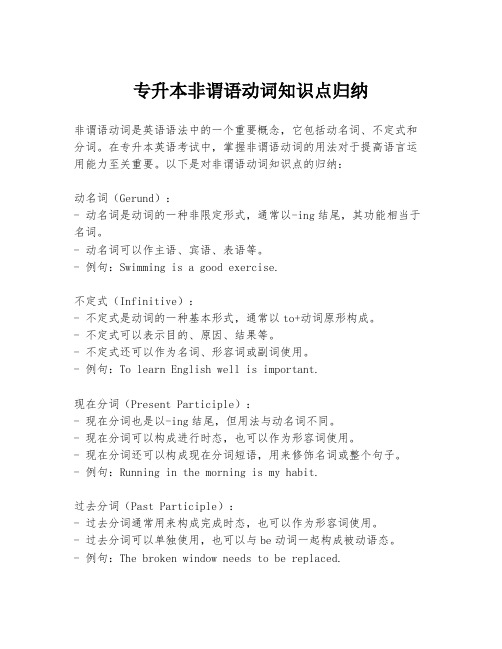
专升本非谓语动词知识点归纳非谓语动词是英语语法中的一个重要概念,它包括动名词、不定式和分词。
在专升本英语考试中,掌握非谓语动词的用法对于提高语言运用能力至关重要。
以下是对非谓语动词知识点的归纳:动名词(Gerund):- 动名词是动词的一种非限定形式,通常以-ing结尾,其功能相当于名词。
- 动名词可以作主语、宾语、表语等。
- 例句:Swimming is a good exercise.不定式(Infinitive):- 不定式是动词的一种基本形式,通常以to+动词原形构成。
- 不定式可以表示目的、原因、结果等。
- 不定式还可以作为名词、形容词或副词使用。
- 例句:To learn English well is important.现在分词(Present Participle):- 现在分词也是以-ing结尾,但用法与动名词不同。
- 现在分词可以构成进行时态,也可以作为形容词使用。
- 现在分词还可以构成现在分词短语,用来修饰名词或整个句子。
- 例句:Running in the morning is my habit.过去分词(Past Participle):- 过去分词通常用来构成完成时态,也可以作为形容词使用。
- 过去分词可以单独使用,也可以与be动词一起构成被动语态。
- 例句:The broken window needs to be replaced.非谓语动词的用法比较:- 动名词和不定式都可以作主语,但动名词更强调动作本身,而不定式强调动作的目的或结果。
- 当动名词和不定式作宾语时,选择哪一个取决于动词的习惯用法。
- 分词作定语时,现在分词表示正在进行,过去分词表示被动或完成。
特殊结构:- 不定式可以用作某些形容词或副词的宾语,形成复合结构。
- 动名词和不定式都可以用于某些特定的句型中,如“would ratherdo than do”等。
练习与应用:- 通过大量的练习来熟悉非谓语动词在不同句子结构中的用法。
成考专升本英语动词不定式归纳复习

成考专升本英语动词不定式归纳复习成考专升本英语动词不定式归纳复习动词+疑问代(副)词+不定式这类动词常见的有:advise,decide, discuss, find out, forget, inquire, know, learn, regard, remember, see, settle, teach, tell, think(=consider), understand, wonder等。
这些疑问代(副)词有what, when, where, which, how, whether等,但不包括why,如:He does not know how to go therewhen to speak before strangers.who(m) to visit.which one to choose.You can decide whether to go forward or stay here.when to see a doctor.I will show you what to do.where to go.how to deal with it.其中,1)和2)中不定式的逻辑主语仍是句子的.主语,分别为He和You;而3)中不定式的逻辑主语则不是句子的主语I,而是宾语you.9) The director of this organization must know .[A] to manage money, sell his product and beable to satisfy stockholders[B] managing money, selling, and be able to satisfy the stockholders[C] how to manage money, sell his product, and satisfy the stockholders[D] money management, selling and being able to satisfy the stockholders10) To tell you the truth, I really don't know how deal with a man like him.[A] can I[B] well[C] to[D] much。
动词不定式的语法总结

动词不定式的语法总结动词不定式是非谓语动词的一种形式,是英语中常见的一种语法,学生一定要做好总结,拿下这个知识点。
小编为大家力荐了动词不定式常用的语法总结,给大家作为参考,欢迎阅读!动词不定式的七种用法动词不定式的基本形式为to+动词原形.1.动词不定式做主语.谓语用第三人称单数形式.如果主语较长则用it做形式主语,将真正的主语动词不定式放到句尾.egTo see is to believe.It's a bad habit to run after dinner.2 做表语.the important things is to save lives.3 做宾语he likes to play with children.4做宾语补足语.形容词做宾补时.常用it做形式宾语.把真正的宾语放到宾补之后.he feels it happy to help others.5做定语she asked me to help her with her English.6做状语you are never too old to learn.(结果状语)7特殊疑问词+动词不定式.I am thinking about what to say.动词的不定式的用法口诀①不定式有标记,to与动词连一起。
②没有人称数变化,动词特点它具备。
③主宾定状表补语,唯独作谓不可以。
④not 加上不定式,否定结构要牢记。
⑤疑问词与不定式,构成短语有意义。
⑥仔细推敲多思考,准确判断有依据。
动词不定式专题练习1. This company was the first ____ portable radios as well as cassette tape recorders in the world.A. producingB. to produceC. having producedD. produced2. The purpose of new technology is to make life easier, ____it more difficult.A .not making B. not make C .not to make D. nor to make3. Helen had to shout ______above the sound of the music .A .making herself hear B. to make herself hearC. making herself heard D .to make herself heard4. I don’t know whether you happen_______ ,but I am going to study in the U.S.A this September.A .to be heard. B. to be bearing C .to hear D .to have heard5. The news reporters hurried to the airport, only ______the film stars had left.A .to tellB .to be toldC .tellingD .told6. You were silly not _______your car.A. to lockB. to have lockedC. lockingD. having locked7. The teacher asked us ______so much noise.A .don’t make B. not make C. not making D .not to make8. An army spokesman stressed that all the soldiers had been ordered _____clear warnings before firing any shots.A .to issue B. being issued C. to have issued D. to be issued9. I’d rather have a room of my own, however small it is, than_______ a room with someone else.A. to shareB. to have sharedC. shareD. sharing10. The bank is reported in the local newspaper_________ in broad daylight yesterday.A. robbedB. to have been robbedC. being robbedD. having been robbed11. A number of paintings in the castle are believed ________ina fire.A. being destroyedB. having been destroyedC. to be destroyedD. to have been destroyed12. The meeting _______ next week is sure to be a great success.A. to take placeB. to be taken placeC. to have taken placeD. being taken place13. As a result of my laziness, I failed ________ my work in time.A. and finishedB. to finishC. and finishingD. to finished14. I am sorry ______ written you a letter at the time.A. to have notB. to not haveC. not to haveD. not having15. Will you lend him a magazine _________?A. to be readB. for readingC. to readD. he read16. He could do nothing but _______for the bus _________.A. wait, to comeB. wait; comeC. waiting; comingD. waited; came17 .It is a problem that doesn't need ________ right now.A. to solveB. solvingC. being solvedD. to be solving18. There’s a man at the reception desk who seems very angry and I think he means _______ trouble.A. makingB. to makeC. to have madeD. having made19. I remember _______him _______the bike needed __________.A. hearing, saying, to repairB. to hear, say, to repairC. hearing, say, repairingD. to hear, saying, to be repaired20. --- You should have thanked her before you left.--- I meant _________, but when I was leaving I couldn’t find her anywhere.。
英语(专升本)10-12

1、They built a highway ___ the mountains.A、lead intoB、to lead intoC、led intoD、leading into您的答案:A正确答案:D 得分:0.0 分解析:leading into的逻辑主语是highway,它们之间是主动的关系,所以用动名词形式。
句意:他们修建了一条通往山里的公路。
2、It ___ for two hours now.A、rainsB、is rainingC、has rainedD、has been raining您未做该题正确答案:D 得分:0.0 分解析:雨现在还在下,是持续到现在的动作,所以根据句意,用现在完成进行时比较好。
3、The girl was lucky enough to ___ the bad men and ran away.A、break awayB、break away fromC、break outD、break into您未做该题正确答案:B 得分:0.0 分解析:break away:脱离,逃离,逃走。
符合句意。
介词from与后面的the bad men连接。
break out:爆发。
break into:闯入,潜入,破门而入。
4、The policeman came up to the lonely house with the door ___, ___ there for a while and then entered it.A、open; to standB、opening; stoodC、open; stoodD、opened; standing您未做该题正确答案:C 得分:0.0 分解析:with the door open是with 的复合结构,open 为形容词,表状态;stood与came,entered为并列关系,在句中作谓语。
5、___ the new plan can be carried out will be discussed at the meeting tomorrow.A、WhichB、WhatC、ThatD、Whether您未做该题正确答案:D 得分:0.0 分解析:句意为“是否执行新的计划将在明天的会议上进行讨论”。
专升本英语必背的非谓语
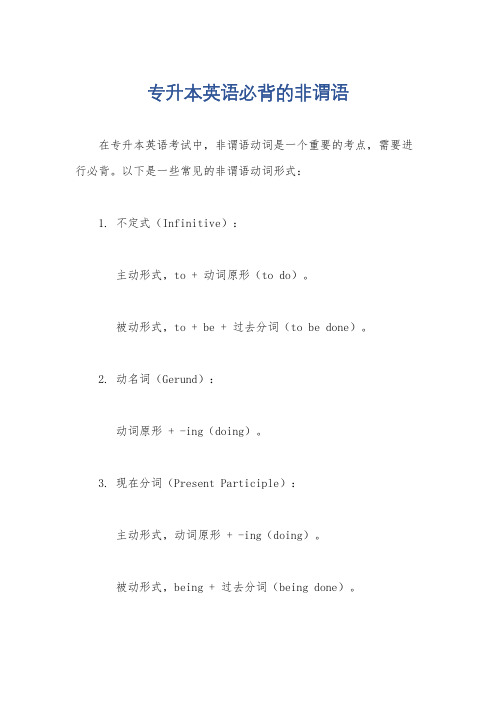
专升本英语必背的非谓语在专升本英语考试中,非谓语动词是一个重要的考点,需要进行必背。
以下是一些常见的非谓语动词形式:1. 不定式(Infinitive):主动形式,to + 动词原形(to do)。
被动形式,to + be + 过去分词(to be done)。
2. 动名词(Gerund):动词原形 + -ing(doing)。
3. 现在分词(Present Participle):主动形式,动词原形 + -ing(doing)。
被动形式,being + 过去分词(being done)。
4. 过去分词(Past Participle):常规形式,动词过去分词形式(done)。
被动形式,having + 过去分词(having done)。
下面是一些常见的非谓语动词的用法和例句:1. 不定式:作主语,To learn a foreign language is important.作宾语,She wants to study abroad.作目的状语,He went to the library to borrow some books.作结果状语,She was too tired to continue working.2. 动名词:作主语,Swimming is good for health.作宾语,I enjoy reading books.作介词宾语,He is interested in playing basketball.作定语,I bought a writing pen.3. 现在分词:作定语,The running water is very clean.作状语,He left the room, laughing loudly.作补足语,I found him sitting alone in the park.4. 过去分词:作定语,The broken window needs to be repaired.作状语,Having finished his homework, he went to bed.作补足语,She felt excited, having won thecompetition.需要注意的是,非谓语动词的形式和用法在句子中的位置和语境可能会有所变化。
2024成人高考专升本《英语》考点知识点汇编复习资料(完整版)

第一部分语法知成考专升本英语-考点汇编识第一章名词一、可数名词的复数形式(一)、规则的变复数方法1、一般情况,直接+steacher---teachers ;student---students ;father---fathers ;mother---mothers2、s,x,ch,sh 结尾的单词+esdress---dresses ;box---boxes ;match---matches ;dish---dishes3、以辅音字母+y 结尾的单词:变y 为i,+escity---cities;baby---babies boy---boys*辅音字母判断方法:26个字母中,5个元音:A 、E 、I 、O 、U ,21个辅音:26-5=21个4、以“o”结尾的单词,(1)以"辅音字母+o"结尾的单数名词后+eshero---heroes;mango---mangoes;potato---potatoes;tomato---tomatoes(2)以"元音字母+o"结尾的单数名词后加+szoo---zoos bamboo----bamboos(3)某些外来词,只在词尾+sphoto----photos;piano----pianos5、以f 、f e 结尾的单词,(1)大多数变f 、f e 为“v”+es妻子:wife---wives小刀:knife---knives 狼:wolf---wolves小偷:thief---thieves架子:shelf---shelves自己:self---selves生命:life---lives一半:half---halves叶子:leaf---leaves(2)少部分直接+sroof---roofs屋顶;belief---beliefs信仰;proof---proofs证明;校样*记忆口诀:妻子拿刀去砍狼、小偷吓得发了慌、躲在架后保己命、半片树叶遮目光。
动词不定式语法总结

动词不定式语法总结动词不定式是英语中的一种特殊形式,由“to + 动词原形”构成。
它在句子中可以充当名词、形容词或副词,具有多种用法和功能。
本文将对动词不定式的语法进行总结和归纳。
一、动词不定式作主语动词不定式可以作为句子的主语,常用结构为“动词不定式+ 谓语”。
例如:“To learn a foreign language is beneficial for personal development.”(学习一门外语对个人发展是有益的)。
“To travel is my dream.”(旅行是我的梦想)。
二、动词不定式作宾语1. 动词不定式作及物动词的宾语,常用结构为“动词+ 动词不定式”。
例如:“I want to learn how to play the guitar.”(我想学弹吉他)。
“She promised to help me with my homework.”(她答应帮我做作业)。
2. 动词不定式作介词的宾语,常用结构为“介词 + 动词不定式”。
例如:“I am good at playing basketball.”(我擅长打篮球)。
“He is interested in learning about different cultures.”(他对了解不同文化很感兴趣)。
三、动词不定式作表语动词不定式可以作为句子的表语,常用结构为“主语+ 系动词+动词不定式”。
例如:“Her dream is to become a doctor.”(她的梦想是成为一名医生)。
“His goal is to win the championship.”(他的目标是赢得冠军)。
四、动词不定式作定语动词不定式可以作为句子中名词的定语,常用结构为“名词+ 动词不定式”。
例如:“I have a book to read.”(我有一本书要读)。
“She has a meeting to attend.”(她有一个会议要参加)。
- 1、下载文档前请自行甄别文档内容的完整性,平台不提供额外的编辑、内容补充、找答案等附加服务。
- 2、"仅部分预览"的文档,不可在线预览部分如存在完整性等问题,可反馈申请退款(可完整预览的文档不适用该条件!)。
- 3、如文档侵犯您的权益,请联系客服反馈,我们会尽快为您处理(人工客服工作时间:9:00-18:30)。
2019年成考专升本英语动词不定式归纳(10)
不定式的完成式、实行式和完成实行式:这三类在考研题中出现的频率很高,要特别注意不定式的这三种形式
1、如果不定式所表示的动作与主要谓语所表示的动作(状态)同时(或几乎同时)发生或发生在主要谓语之后,那么用不定式的一般形式
He received a warm welcome from the Australians and from his family who had flown there to meet him.
In 1967, he arrived back in England, where a quarter of a million people were waiting to welcome him.
After all, eighty was a special birthday, another decade lived or endured just as you chose to look at it.
Now suddenly she began to sob, holding herself in as if weeping were a disgrace.
2、如果不定式所表示的动作(状态)发生在主要谓语动词或特定的某时间之前,那么不定式就要用其完成式
She feels relaxed to have finished writing her thesis before the deadline.
33)The Vikings are believed America.
[A] to have discovered[B] in discovering[C] to
discover[D] to have been discovered
34)The students were to at the auditorium before 1:30 pm, but the lecture was cancelled at the last minute.
[A] assembled [B] have assembled [C] assembling [D] be assembled
35)He was to the new ambassador, but he fell ill.
[A] having telephoned[B] have telephoned[C] has telephoned[D] telephoning
3、不定式实行式表示主要谓语动词所表示的动作(情况)发生时,不定式所表示的动作正在发生
When he came in, I happened to be doing my experiment in the lab.
Why do you stand here?You are supposed to be working in the workshop.
4、不定式完成实行式表示其动词所代表的动作,在主要谓语动词所代表的动作之前一直在实行
The students from the Department of Sociology are said to have been investigating the possibility of producing the new product.
They are quite happy to have been cooperating harmoniously with us till now.。
